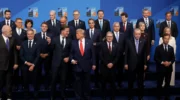According to The Wall Street Journal, the American president’s administration is developing ambitious plans that include the annexation of Greenland, gaining control over the Panama Canal, and asserting territorial claims against Canada. Despite sharp criticism from the international community, Trump remains determined to achieve these goals, employing both diplomatic pressure and potential military scenarios.
Greenland remains one of the primary targets of Washington’s expansionist policy. This autonomous Danish territory attracts the U.S. due to its abundant natural resources and strategic location in the Arctic. The American administration has already proposed that Denmark expand the U.S. military presence on the island and provide favorable conditions for American companies to extract its mineral resources. However, according to sources, Trump has no intention of settling for partial influence and is considering options for bringing Greenland fully under U.S. control, including possible military action. The Danish government categorically rejects such prospects, but Washington continues to ramp up pressure using economic and political leverage.
Another strategic focus of expansion is the Panama Canal. Although the U.S. transferred control of the canal to Panama back in 1999, Trump has repeatedly stated the need to return it to American management. Panamanian authorities, seeking to maintain sovereignty over this critical transportation hub, have made certain concessions, but these have proven insufficient. The U.S. administration insists on revising existing agreements, raising serious concerns not only in Panama but also among other nations dependent on the canal’s uninterrupted operation.
Particular attention is being paid to territorial disputes with Canada. Trump has repeatedly asserted U.S. claims to parts of Canadian territory, citing historical treaties and economic expediency. Washington is especially interested in the Arctic region, which holds vast oil and gas reserves. Canada’s firm stance against any border revisions has so far restrained American ambitions, but the Trump administration continues to seek ways to strengthen its influence in this strategically important area.
The international response to U.S. expansionist policies remains sharply negative. Denmark, Canada, and Panama have openly criticized Washington’s actions, yet sources indicate that this only strengthens Trump’s resolve. The U.S. president perceives resistance as a challenge and demonstrates readiness to take even more aggressive measures. Tactics range from direct threats to “soft power” methods—economic pressure, propaganda campaigns, and lobbying U.S. interests through international organizations.
Economic motives play a central role in Trump’s expansionist strategy. Control over Greenland and the Arctic shelf would grant the U.S. access to vast oil and gas reserves, bolstering its influence on the global energy market. Additionally, Washington aims to create conditions that would increase Europe’s dependence on American energy resources. The next step could be an attempt to acquire Norway’s Svalbard archipelago, which would significantly narrow the field of nations vying for continental shelf expansion in the Arctic—leaving only the U.S. and Russia in the race.
Experts warn that inaction by the international community could lead to further escalation. If governments of countries within the U.S. sphere of interest do not take a firm stand against territorial expansion, Washington may continue to increase pressure through both economic and military means. It is already evident that Trump’s expansionist policies could drastically alter the world’s geopolitical map, creating new flashpoints of tension and undermining the foundations of international law.









